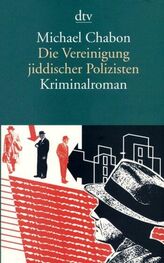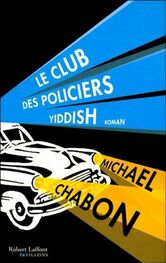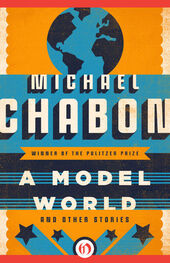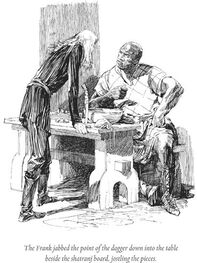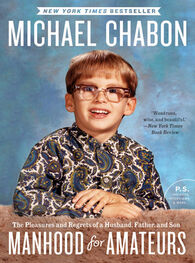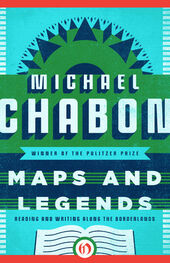“I can’t believe I did that,” she says, availing herself of a tissue from her endless stash. “That is the kind of thing you would do.”
“People I know keep having that problem,” Landsman says. “Suddenly acting like me.”
“We’re law officers. We uphold the law.”
“People of the book,” Landsman says. “As it were.”
“Fuck you.”
“Do you want to go back in there and arrest him?” he says. “We can. We have the cable from the tunnel. We can hold him. Start from there.”
She shakes her head. The bachelor on his map of stains is staring at them, hitching up the seat of his black serge trousers and taking it all in. Landsman decides he’d better get her out of there. He puts his arm around her for the first time in three years and ushers her over to the Super Sport, then goes around to his side and climbs in behind the wheel.
“The law,” she says. “I don’t even know what law I’m talking about anymore. Now I’m just making this shit up.”
They sit silently as Landsman wrestles with the perennial detective problem of being obliged to state the obvious.
“I kind of like this new crazy, confused Bina and all,” he says. “But I feel I have to point out that we have no real leads on the Shpilman case. No witnesses. No suspect.”
“Well, then, you and your partner had better fucking get me a suspect,” she says. “Hadn’t you?”
“Yes, ma’am.”
“Let’s go.”
He starts the ignition, puts the Super Sport in gear.
“Hold on,” she says. “What’s that?”
Across the platz, a big black four-by-four pulls up around the east side of the rebbe’s house. Two Rudashevskys get out of it. One goes around to open the rear gate of the vehicle. The other waits at the bottom of the side steps, hands knotted loosely behind him. A moment later, two more Rudashevskys come out of the house, humping several hundred cubic meters of what appears to be hand-painted French luggage. Quickly and with little regard for the laws of solid geometry, the four Rudashevskys manage to fit all of the trunks and bags into the back of the four-by-four.
Once they have accomplished that feat, a big chunk of the house itself breaks off and falls into their arms, wearing a gorgeous fawncolored alpaca coat. The Verbover rebbe does not look up, or back, or around at the world he rebuilt and is now abandoning. He lets the Rudashevskys do their quantum origami on him, folding him and his canes into the backseat of the four-by-four. The yid just joins his luggage and rolls on.
Fifty-five seconds later, a second four-by-four pulls up, and two women in long dresses, heads covered, are helped into the back along with their city of baggage and a number of children. The process is repeated with females and children and black four-by-fours for the next eleven minutes.
“I hope they have a very big airplane,” Landsman says.
“I didn’t see her,” Bina says. “Did you see her?”
“I don’t think so. I didn’t see Big Shprintzl, either.”
Half a second later, Bina’s Shoyfer rings.
“Gelbfish. Yes. We did wonder. Yes. I understand.” She snaps the phone shut. “Drive around the back of the house,” she says. “She saw your car.”
Landsman guides the Super Sport through a narrow alley and into a courtyard behind the rebbe’s house. Apart from the car, there is nothing that would have been out of place a hundred years ago. Stone flags, stucco walls, leaded glass, a long half-timbered gallery. The flags are slick, and water drips from a row of potted ferns that hang from the underside of the gallery.
“She’s coming out?”
Bina doesn’t answer, and after a moment, a blue wooden door opens in a low wing of the great high house. The wing is set at a crooked angle to the rest of the building, and it sags with picturesque accuracy. Batsheva Shpilman is still dressed more or less for a funeral, her head and face wrapped in a long, sheer veil. She doesn’t cross the gap of perhaps eight feet separating her from the car; she just stands on the doorstep with the faithful bulk of Shprintzl Rudashevsky looming in the shadows behind her.
Bina rolls down the window on her side. “You aren’t leaving?” she says.
“Did you catch him?”
Bina doesn’t play games or act stupid. She just shakes her head.
“Then I’m not leaving.”
“It might take a while. It might take longer than we really have.”
“I certainly hope not,” says Mendel Shpilman’s mother. “That man Zimbalist is sending his idiots in their yellow pajamas over here to number every stone in this house so that it can be disassembled and then reassembled in Jerusalem. If I’m still here in two weeks, I’m going to be sleeping in Shprintzl’s garage.”
“It would be my very great honor,” says what is either a very grave talking donkey or Shprintzl Rudashevsky from behind the rebbe’s wife.
“We will catch him,” Bina says. “Detective Landsman just swore me an oath to that effect.”
“I know what his promises are worth,” Mrs. Shpilman says. “So do you.”
“Hey!” Landsman says, but she has already turned and gone back into the crooked little building from which she emerged.
“All right,” Bina says, clapping her hands together. “Let’s get started. What do we do now?”
Landsman taps the wheel, considering his promises and their worth. He was never unfaithful to Bina. But there is no doubt that what broke the marriage was Landsman’s lack of faith. A faith not in God, nor in Bina and her character, but in the fundamental precept that everything befalling them from the moment they met, good and bad, was meant to be. The foolish coyote faith that could keep you flying as long as you kept kidding yourself that you could fly.
“All day I’ve been craving stuffed cabbage,” he says.
From the summer of 1986 to the spring of 1988, when they defied the wishes of Bina’s parents and moved in together, Landsman sneaked in and out of the Gelbfish home to make love with her. Every night unless they were quarreling, and sometimes in the thick of a quarrel, Landsman climbed the drainpipe and tumbled in through Bina’s bedroom window to share her narrow bed. Just before dawn she would send him back down again.
Tonight it took him longer and cost him more effort than his vanity would care to admit. As he passed the halfway mark, just above Mr. Oysher’s dining room window, Landsman’s left loafer slipped, and he dangled free and thrilling over the black void of the Gelbfish backyard. The stars overhead, the Bear, the Snake, exchanged places with the rhododendron and the wreckage of the neighbors’ sukkoh. In regaining a purchase, Landsman tore the leg of his trousers on the aluminum bracket, his old enemy in the struggle for control of the drainpipe. Foreplay between the lovers commenced with Bina balling up a tissue to blot the cut on Landsman’s shin. His shin with its blotches and freckles, with its strange midlife bloom of black hair.
They lie there on their sides, a couple of aging yids stuck together like pages of an album. Her shoulderblades dig into his chest. The knobs of his patellas are notched against the soft moist backs of her knees. His lips can blow softly across the teacup of her ear. And a part of Landsman that has been the symbol and the site of his loneliness for a very long time has found shelter inside of his commanding officer, to whom he was once married for twelve years. Although, it’s true, his tenure inside her has grown precarious. One good sneeze could pop him loose.
“The whole time,” Bina says. “Two years.”
“The whole time.”
“Not once.”
“Not even.”
“Weren’t you lonely?”
“Pretty lonely.”
Читать дальше

